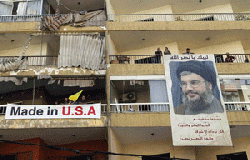The Western media have double standards when it comes to “terrorism.” Within hours after two bombs were detonated at the Boston Marathon last April, many in the media had christened it a “terrorist attack.” Meanwhile, the August 15 bombing in south Beirut that killed at least two dozen is a “blast” that occurred in a “Hizbullah stronghold.”
On 15 April 2013, in the middle of the afternoon, two pressure cooker bombs exploded 13 seconds apart near the finish line of the Boston Marathon. Three spectators were killed, including an 8-year-old boy, and 264 others suffered an array of injuries.
The perpetrators were two young American citizens, brothers from a Chechen-Avar background, Dzhokhar and Tamerlan Tsarnaev. Days after the event, they were hunted down by the Boston police. Tamerlan was killed, while his younger brother Dzhokhar was captured and could now face the death penalty.
Four months to the day, a car bomb exploded in the early evening at a busy intersection in the heavily populated residential neighborhood of Roueiss in the southern part of Beirut. More than 20 have died, and a further 355 have been injured.
But only of one of these tragic incidents was immediately defined as a “terror attack” by major media agencies in the United Kingdom and United States, while the other is a “car bomb blast” – represented sub-textually as an unfortunate, but somehow understandable, act of violence.

The term “terrorism” is a fluid, politically-loaded term. Even the historical evolution of the word “terrorism” – born out of the bloodbath conducted by the French Republic after the French Revolution and now used today as a universally ambiguous categorization directed toward non-state actors – is reflective of how potent the term is. When it is used today, there are significant legal and military ramifications that give it compelling potency.
There are a number of mostly similar, official definitions by various U.S. governmental and military departments.
The Department of State defines “terrorism” as “premeditated, politically motivated violence perpetrated against noncombatant targets by subnational groups or clandestine agents.”
Across the Atlantic, the United Kingdom states that “terrorism,” as defined in its Terrorism Act 2000, “involves serious violence against a person; involves serious damage to property; endangers a person’s life, other than that of the person committing the action; creates a serious risk to the health or safety of the public or a section of the public; or is designed seriously to interfere with or seriously to disrupt an electronic system.”
Understanding and being aware of these definitions by the government bodies is important because it informs and shapes how the media in such states categorize and discuss “acts of terror” whenever they occur.
Glenn Greenwald explains the matter succinctly:
“The word ‘terrorism’ is, at this point, one of the most potent in our political lexicon: it single-handedly ends debates, ratchets up fear levels, and justifies almost anything the government wants to do in its name. It’s hard not to suspect that the only thing distinguishing the Boston attack from Tucson, Aurora, Sandy Hook and Columbine (to say nothing of the U.S. “shock and awe” attack on Baghdad and the mass killings in Fallujah) is that the accused Boston attackers are Muslim and the other perpetrators are not. As usual, what terrorism really means in American discourse – its operational meaning – is: violence by Muslims against Americans and their allies.”
These are the harsh facts, and they explain the nature of the foreign coverage of the tragedy in southern Beirut on August 15.
To put it in perspective, it is akin to describing the Boston Marathon bombing as an attack on a “democrat strong-hold.“
Despite the fact that the perpetrators and the act itself snugly fit into the legal definition of “terrorism” by the U.S. and UK authorities, the media coverage by British and American media outlets described it as a “bomb blast” from a possible “suicide attack.”
More so, as media critic and former editor-at-large of Al-Akhbar English Emily Dische-Becker in Berlin observed to the Institute of Public Accuracy, many Western news agencies took great pains to add that the car bomb explosion occurred in a “Hizbullah stronghold.”
Virtually all reports on the attack on the residential neighborhood of Roueiss noted Hizbullah’s military involvement in Syria, therefore subtly inferring that the attack was justifiable despite the fact that the victims were innocent civilians. Those killed will not have the leisure of being named and cared for by extensive human-oriented stories, slick infographics, painful photo galleries, and a barrage of follow-up tales of coping the day after.
This “context” was not provided by the mainstream press when it came to the Boston bombing and other similar incidents over the past decade. To put it in perspective, it is akin to describing the Boston Marathon bombing as an attack on a “democrat strong-hold,” possibly linked to the brutal, destructive military invasions and bloody escapades of the Americans and their allies.
In both incidents, people have died and been maimed by terrible acts. Yet it seems that only one is an “act of terror,” while the other is merely a fact-of-life.
Al-Akhbar, TAAN






Leave a Reply